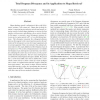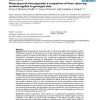1285 search results - page 45 / 257 » On the Complexity of Ordinal Clustering |
APAL
2010
13 years 9 months ago
2010
A well-known polymodal provability logic GLP is complete w.r.t. the arithmetical semantics where modalities correspond to reflection principles of restricted logical complexity in...
CVPR
2010
IEEE
13 years 9 months ago
2010
IEEE
Shape database search is ubiquitous in the world of biometric systems, CAD systems etc. Shape data in these domains is experiencing an explosive growth and usually requires search...
BMCBI
2006
13 years 9 months ago
2006
Background: Trait heterogeneity, which exists when a trait has been defined with insufficient specificity such that it is actually two or more distinct traits, has been implicated...
ICDE
2010
IEEE
14 years 3 months ago
2010
IEEE
— Network clustering enables us to view a complex network at the macro level, by grouping its nodes into units whose characteristics and interrelationships are easier to analyze ...
CIKM
2009
Springer
14 years 3 months ago
2009
Springer
Clustering ensembles combine different clustering solutions into a single robust and stable one. Most of existing methods become highly time-consuming when the data size turns to ...


